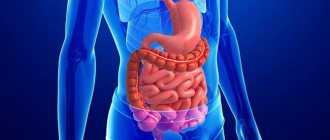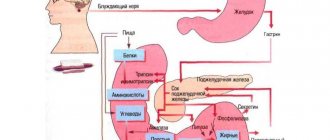The cause of dizziness and sweating requires careful analysis. The underlying factors of such ailment can manifest themselves not only independently, but also have a long-term (chronic) nature, requiring medical intervention. But if the symptom is one-time and appears for the first time, it means nothing other than overwork. If this phenomenon occurs frequently, you should immediately contact the clinic.
Causes of the condition
Dizziness (vertigo) is often accompanied by numerous symptoms, including sweating. This is a consequence of serious pathologies, exposure to climatic conditions or various injuries. But it can also arise from fatigue.
The cause of the disorder, when dizziness, unexpected sweating and severe weakness appears, can be determined by certain signs:
- unilateral sweating - a disorder in the central nervous system;
- sweating occurs at night - lung diseases;
- dizziness with sweat – thyroid disease;
- dizziness with profuse sweating from any exertion – diabetes;
- both symptoms are pronounced - obesity.
If there are serious pathologies, then the person breaks into a cold sweat and becomes dizzy even from minor exertion. Perhaps this is chronic fatigue syndrome, which also manifests itself as dizziness and profuse sweating.
What is the treatment?
Signs of nausea and cold sweat, which constantly bother you, are a manifestation of a certain pathological process that occurs in the body. Conducting self-medication in such conditions will not only be pointless, but also dangerous for human life. The primary task is to conduct diagnostics to determine what pathogenic process causes these manifestations. Consequently, the treatment method for each case will be selected individually by the attending physician.
Diseases that are accompanied by dizziness and sweating
The combination of dizziness and severe sweating is characteristic of certain diseases.
Weak vessels. The tendency to vegetative-vascular dystonia increases with a poor diet and unhealthy lifestyle. In addition to dizziness and hyperhidrosis, diarrhea and nausea occur.
Menopause. In women at this time, hormonal changes cause many unpleasant sensations, including dizziness and sweating.
Diabetes. If there is not enough sugar in the blood, the patient begins to sweat heavily and lose balance. Weakness and diarrhea appear.
Migraine. Attacks of pain, reaching the point of nausea, are often accompanied by tremors and sweating, which are also accompanied by dizziness.
Intracranial pressure. “Whirlwinds” in the head are formed due to impaired blood flow and insufficient oxygen supply to the brain. With a maximum increase in such pressure, dizziness can result in loss of consciousness.
Vascular diseases. Heart attack and ischemia are accompanied by sweat and severe circling. When a stroke begins, a person becomes unbalanced and sweats heavily.
Diseases of the inner ear. The disease is provoked by infections and otitis media. Symptoms include nausea with dizziness and cold sweats.
Malfunction of the vestibular apparatus. Symptoms are variable and usually sudden. Naturally, severe dizziness and nausea. The patient begins to break into a sweat.
Neurotic diseases. The symptoms of these diseases are very typical of vertigo. Accompanied by hyperhidrosis, buzzing and frequent circling.
Hypoglycemia. Symptoms: dizziness with sweating, palpitations, involuntary urination. The disease is serious, you can fall into a coma.
Epstein-Barr virus. It enters the body during blood transfusion, oral sex, and even through kissing. Accompanied by dizziness, heavy sweating, and fever. Causes pneumonia and hepatitis. Sometimes the disease ends in death or paralysis.
Common cold. If after recovery there is a feeling of weakness, dizziness, sudden sweating, do not worry. These are typical signs that accompany a person after suffering a viral disease. In the fight against inflammation, the body has exhausted its energy reserves and it is not surprising that such symptoms appear.
All the symptoms are very similar, but the reasons for their appearance are completely different. This means that the treatment will be different. If you are sweating and often feel dizzy, do not ignore the help of doctors.
Common cold
Fatigue and lethargy are factors that always accompany any acute respiratory viral disease. Therefore, as soon as you feel them, immediately measure your temperature. If it is elevated, and rhinitis, cough and headaches begin, this means that you are developing a common cold.
We suggest you familiarize yourself with Fingernail fungus: treatment at home
The thing is that in the fight against the inflammatory process, the body has exhausted all its immune reserves; it worked hard to protect the individual from a progressive infection. It is not surprising that his strength is running out. To restore them, a person is recommended to eat a lot of vitamin foods and protein foods.
Eliminating symptoms
Knowing the reasons that caused them will help you get rid of symptoms such as dizziness and increased sweating:
- if the matter is poisoning, first of all, you need to remove the substances that caused the intoxication from the body. In this case, absorbents and a large amount of clean water are used. Activated charcoal helps cope with this disorder perfectly. Modern drugs have also appeared: Enterosgel, Eubicor. Taken strictly according to instructions. The medications are absolutely safe and are indicated even for children;
- if the unpleasant condition is caused by an allergic reaction, then antihistamines are added to the absorbents. The newest antiallergic drugs instantly relieve an attack and do not cause drowsiness;
- infections and viruses that cause such symptoms are treated as prescribed by the doctor. Dizziness and sweating require longer treatment, and this can only be determined by a doctor;
- if you feel dizzy and sweaty due to problems with blood pressure, then such phenomena should not be ignored. You should take appropriate medications, drink water with lemon, and rest well.
If simple measures to eliminate the malaise are ineffective and dizziness persists with sweat, then you can no longer do without the help of a therapist. The nearest clinic will conduct an examination and prescribe the necessary treatment.
Problems with the endocrine system
Another reason why you are worried about fatigue, weakness, and sweating. All these signs can occur against the background of hormonal imbalance. In this case, the person complains of drowsiness, apathy, weight gain, and impaired sensitivity in the arms and legs. Doctors diagnose him with hypothyroidism - insufficient production of hormones by the thyroid gland.
Symptoms can be a consequence of taking medications, for example, drugs that include phenamine or atropine. Overheating in the sun is another deciding factor. If a person suffers from heatstroke, he will also complain of fever, nausea and drowsiness. He is recommended to lie in a cool bath to restore body temperature.
Prevention
You need to take care of your health and not put yourself through long-term treatment. Following simple rules will help you avoid many unpleasant conditions:
- good sleep;
- quitting smoking and alcoholic beverages;
- physical activity;
- fresh air in the bedroom;
- no stress;
- limit coffee consumption.
Even in the presence of serious pathologies, sweating and dizziness can be weakened and even completely eliminated. The main thing is to avoid excessive stress, eat well and develop the right daily routine.
Preventive actions
The preventive complex is based on maintaining a healthy lifestyle, namely:
- a person needs proper rest at night, which lasts at least 8 hours.
- An important step will be to stop using harmful substances;
- make life as active as possible;
- spend more evenings walking in the fresh air;
- regularly ventilate the room before going to bed;
- limit the impact of stressful situations.
The listed causes of nausea and increased sweating are far from harmless. Each of them, with further development, can provoke serious consequences for the human body. If clinical manifestations appear on an ongoing basis, then this is an alarming signal of the development of the disease. Treatment in this case is contraindicated, since the person will not be able to independently determine which disease the manifestations belong to. The main way to overcome discomfort is to seek advice from a specialist and undergo treatment.
Cardiovascular and nervous diseases
Weakness, sweating, fatigue, dizziness are the first “bells” of dangerous pathologies in the body. They may indicate problems with the heart. If at the same time a person suffers from nausea, constricted chest pain, or has numbness in the upper extremities, he should immediately call an ambulance. Sometimes this condition warns of a heart attack and other cardiovascular diseases.
Sometimes, against the background of psychological trauma, rapid fatigue, weakness, and sweating develop. The reasons for this condition are a stressful situation associated with the loss of loved ones, illness of a relative, problems in personal life and at work. Such patients urgently need to unwind: relax, go to the sea for a change of scenery, find a favorite activity, devote time to family and friends.
If nothing helps, and the symptoms are increased by high blood pressure, panic attacks, arrhythmia, fear of loud sounds and bright lights, you should immediately contact a psychiatrist or neurologist. Perhaps this condition is a consequence of asthenia or neurasthenia - pathologies that require the help of a specialist.
Recipes you need
In addition to changing your daily routine, traditional medicine also helps. Here are a few recipes that will relieve you of such obsessive and unpleasant symptoms as weakness, sweating, and fatigue:
- Lemon-garlic water. One sour fruit is finely chopped. Add a couple of cloves of garlic. The mixture is poured into a glass jar and filled with hot water. Place the container in the refrigerator for several days. Then take a tablespoon once a day - half an hour before breakfast.
- Blackcurrant infusion. Thirty grams of leaves are poured into 0.5 liters of boiling water and left for two hours. Drink 1/2 cup three times a day before meals.
- Chicory root decoction. The crushed part of the plant is poured with water and cooked for about 20 minutes over low heat. Strain and take one tablespoon every four hours.
We suggest you read: When blood comes from the mouth
In addition, decoctions of medicinal St. John's wort and juniper cones help with the above symptoms. All of the traditional medicine listed above can restore lost vigor and activity to a person.
Folk remedies will help get rid of unpleasant symptoms such as dizziness and sweating.
- garlic-lemon drink. The fruit is crushed and a small clove of garlic is added. The resulting mixture is poured with boiling water, cooled and left for a week. Then take one spoon daily;
- black currant. The leaves are poured with boiling water and left for two hours. Drink 100 grams three times a day;
- chicory decoction. Grind and cook for about 20 minutes. Take a tablespoon.
For these symptoms, a decoction of juniper cones is also used.
It is important to remember that many causes of dizziness with sweating are not always harmless. The combination of these symptoms can indicate a wide range of diseases, including very dangerous ones. It is better to find time and visit a doctor to make sure that they are absent.
Diagnosis by a doctor
To establish the causes of pathology, a study of the central nervous system is used:
- Brain ultrasound or magnetic resonance imaging.
- Rheoencephalography.
- Electroencephalography.
General blood and urine tests are also required.
In a hypoglycemic state, the patient needs to eat or dissolve several glucose tablets. In case of insulin coma, glucose solution is administered intravenously. Preeclampsia during pregnancy also requires energy in the form of glucose to maintain liver function, which suffers from intoxication. Sweet tea with lemon will relieve nausea.
Vegetative-vascular dystonia requires symptomatic treatment and optimization of the patient’s lifestyle. Cold sweat and dizziness, weakness are serious symptoms that require attention, diagnosis and treatment when identifying the primary pathology.
Phrases from patients that they suddenly felt dizzy and started to sweat are too general for an accurate diagnosis. Therefore, in addition to a description of the symptoms, the results of almost all available laboratory and instrumental research options will be required:
- general and biochemical blood test;
- magnetic resonance and computed tomography;
- ECG;
- neurological tests;
- urine analysis.
In parallel with these studies, blood pressure monitoring is carried out. Based on the data obtained, a course of treatment is determined, the main goal of which is to eliminate the causes of the pathological condition.
In addition to the general therapeutic program, the specialist prescribes general strengthening physiotherapeutic procedures to the patient: • treatment with healing waters; • massage and self-massage; • electro- and reflexology.
In some cases, in order to achieve recovery, the patient has to make significant changes in his lifestyle, adjust his diet and diet, since the problem is often associated with inattention to the needs of his body.
If you are concerned about frequent attacks of nausea, weakness and dizziness, you should consult a doctor. In particular, it is necessary to obtain advice from an otolaryngologist, ophthalmologist, neurologist and endocrinologist. During the initial examination, doctors will refer you for further diagnostic procedures.
Among the laboratory and instrumental diagnostic measures for nausea, dizziness and weakness, the following are most often carried out:
- Blood tests (general and biochemical blood tests).
- Determination of blood glucose levels (including determination of the dynamics of glucose utilization in the blood).
- Electrocardiographic examination of the heart.
- Audiography.
- Tomographic studies (CT, MRI).
- X-ray examination of the skull.
- Ultrasound Dopplerography – to study the condition of cerebral vessels.
As a rule, the above studies are enough to make a diagnosis. In some cases, other specific studies may be required to clarify the diagnosis.
If a woman is pregnant
Expectant mothers often complain of weakness and sweating. Fatigue, the causes of which lie in the physiological characteristics of the body, is a constant companion for a girl in an interesting position. Now the body bears a double load, especially in the third trimester, so it is not surprising that you can forget about your previous activity and vigor for a while.
If any other signs are added to these symptoms, then you should definitely contact a gynecologist or therapist. Thus, high fever, body aches and a severe runny nose may indicate influenza, rubella, cytomegalovirus or another infectious disease. These ailments are very dangerous, as they can provoke abnormal developmental disorders of the fetus or its death in the womb.











